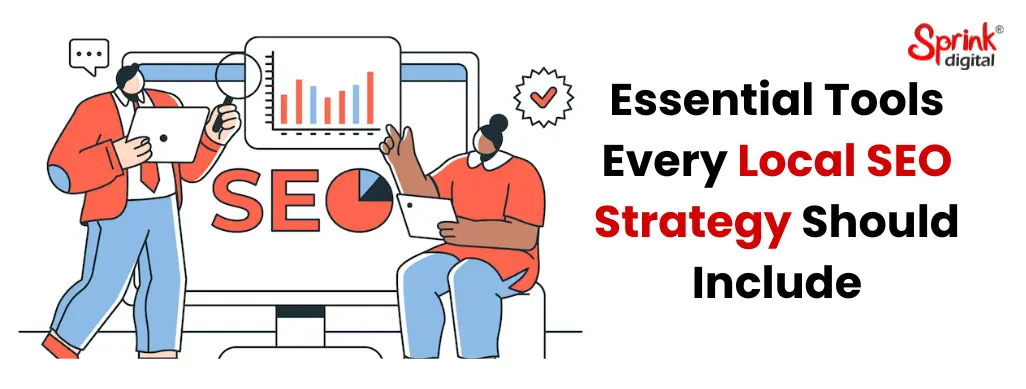
Quick Summary:

Is your business missing out on local customers even though you’re just around the corner? Many local shops and services struggle to get found online despite being right under people’s noses. If you’re investing in traditional marketing but are still invisible on Google Maps, something’s off.
Read on to discover how local SEO services and the right toolkit can bridge that gap, making your business stand out where it matters most.
It is hard to compete for local attention. Thousands of businesses are hungry for visibility, so accuracy and consistency are important. Manually updating listings, monitoring reviews, or carrying out map optimisations are very time-consuming, and often they result in errors. For this very reason, the tools become more and more critical. They
When you invest in the right tools, local SEO services gain extra mileage, giving a business an edge in local search results.
Start with these instruments that must be in your local SEO kit, with each one solving a crucial piece of the puzzle:
Why it’s essential:
Quick Tips:
Why it matters:
These tools help you watch your visibility in nearby search areas.
Popular options:
Why use them:
Why consistency is of the essence:
Conflicting or duplicate entries confuse search engines and customers.
Best listings:
Fetching good benefits such as:
Why did they need:
Ratings and reviews are social proof; customers trust them more than sales promotions.
High-level platforms:
Advantages:
Why search terms matter:
If you don’t know your local audience, you’re shooting in the dark.
Useful tools:
What to focus on:
Why is it important?
Your website must load quickly, be responsive across devices, and be in your customers’ local language.
Tools to consider:
Best practices:
Why is this important?
Trusted local links tell search engines you’re credible.
Here are some tools to help you:
Useful strategies:
Why is it mandatory?
Success can’t be measured without data.
Significant platforms:
What to track:
No tool will be right for every business. To select the best ones:
The goal is not to have every tool but a suite of tools that supports your local SEO services efforts efficiently and saves time!
This routine ensures that your local visibility continues to grow rather than stagnate.
Strong content drives awareness and local relevance. Good content development amplifies all other local SEO efforts:
Ongoing content development provides fresh, local-focused material that boosts your listing quality, website engagement, and local search presence.
If your business wants to be discovered by local customers, relying on instinct or manual updates won’t cut it. Effective Local seo services require a coordinated approach with the right toolkit, ongoing review strategies, and strong Content development. Starting with a few integrated tools and building from there ensures your business is easy to find, trusted by the communit1y, and well-optimized for local growth. Ready to improve your local presence? Now’s the time to build a toolkit that works as hard as you do.
Not always. A lot of businesses can get up and running with some free tools like Google Business Profile and Keyword Planner, which will provide insights and some basic functions. However, if you want more advanced features, automation and deeper analysis of your performance over time, paid tools may be worth investing in.
For people just getting into local SEO, Google Business Profile is often the best first step. It’s free, easy to set up and plays a major part in how a business is displayed on Google Maps and search results in general.
Ideally, you should look at your local SEO metrics on a weekly basis, especially if you are competing in a competitive industry. However, at minimum examining each month will help you to keep your listings accurate, check your progress and help to point out when all you may need to adjust your strategy for local SEO.
Yes, most reputable local SEO tools offer multi-location management capabilities. This can be especially useful for businesses with shopfronts in multiple cities or cities within a region to ensure listings, reviews and rankings have consistency.
Join our growing community and get inspiring articles.
Our highly trained talented teams are committed to providing you with top-level, technical or any other support 24*7.
Ready to get started? Give us a call.